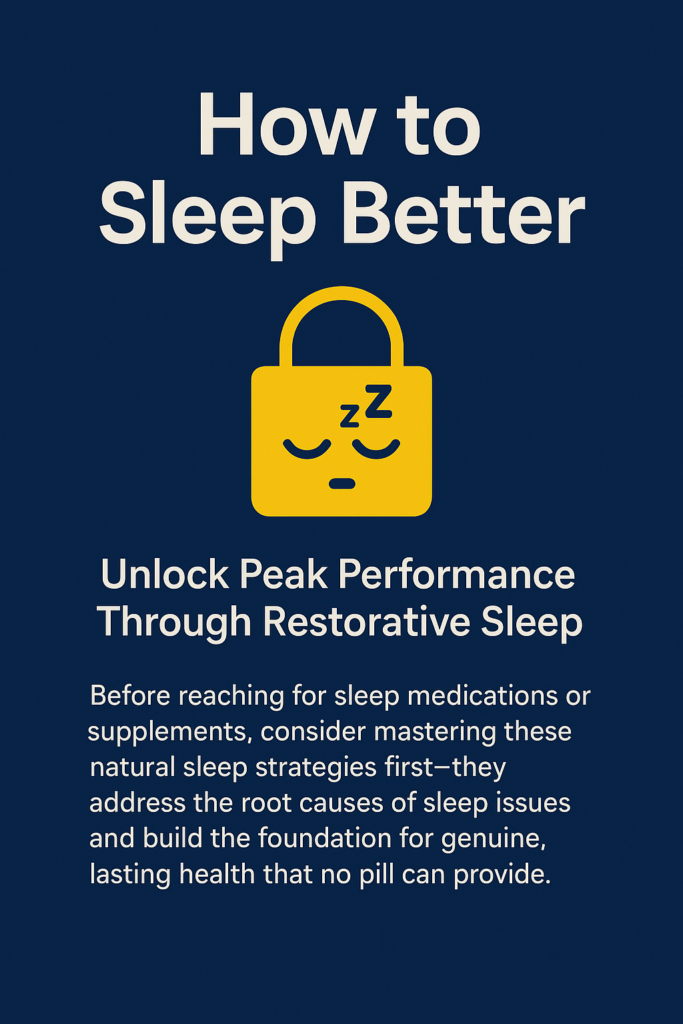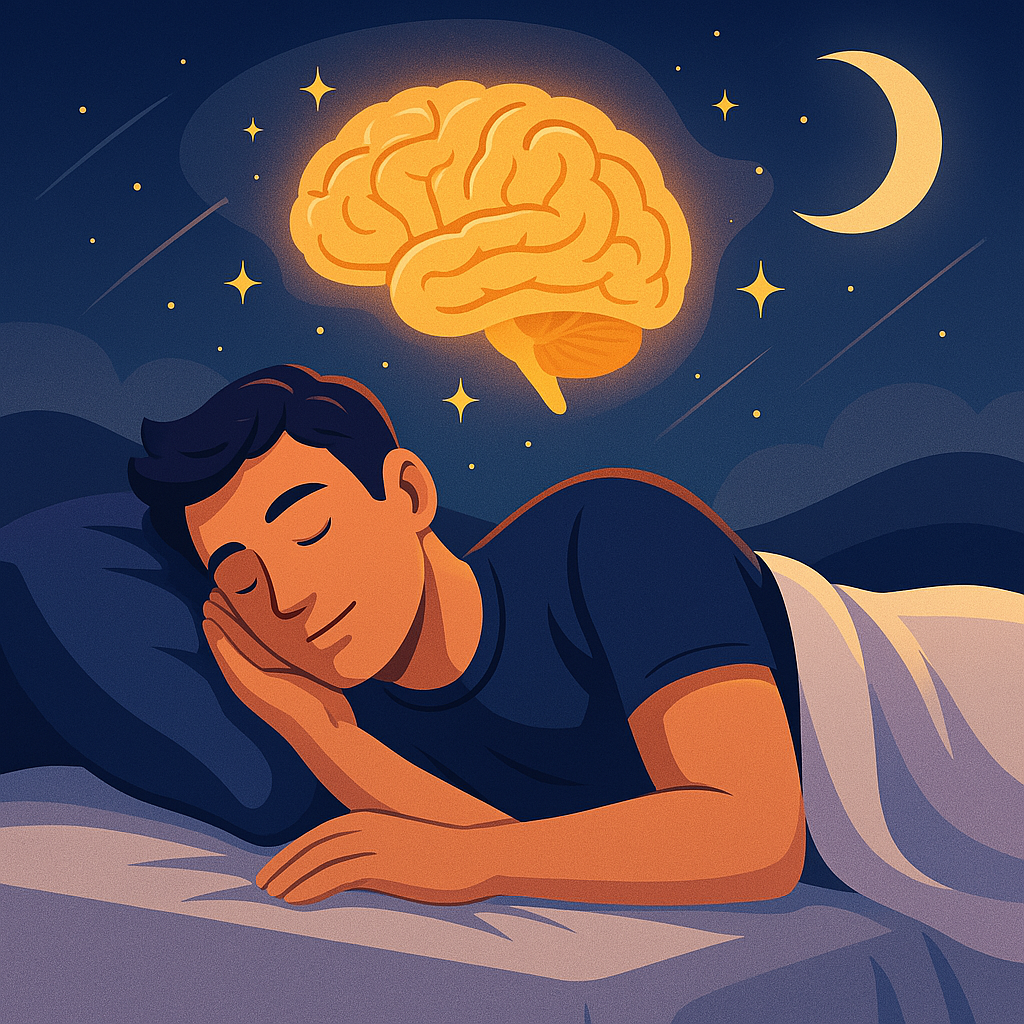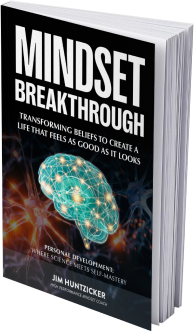How to Sleep Better: Unlock Peak Performance Through Restorative Sleep

Before reaching for sleep medications or supplements, consider mastering these natural sleep strategies first—they address the root causes of sleep issues and build the foundation for genuine, lasting health that no pill can provide.
Sleep is not a luxury — it’s your secret weapon.
If you want to optimize your mind, body, and energy… It starts with the most overlooked habit in personal development: high-quality, consistent sleep.
No matter how disciplined your routine or how strong your mindset, you can’t outperform poor sleep. It affects everything — your mood, metabolism, mental clarity, hormones, willpower, and even your relationships.
If you’re struggling to get quality sleep, you’re not alone. In today’s hyper-connected world, 86% of Americans report sleep problems on a weekly basis.
The truth? If you’re not getting at least 7 hours of actual sleep per night, you’re not fully recharging.
And here’s the kicker: Most people think they’re getting seven hours… but according to data from Oura Health Ltd. (the company behind the Oura Ring), the average person needs to be in bed for 8 full hours just to get 7 hours of actual sleep. That’s because it takes time to fall asleep, and we all wake up multiple times throughout the night — even if we don’t realize it.
This page will walk you through everything you need to set yourself up for consistently deep, high-quality sleep — naturally.
Your Ultimate Sleep Optimization Checklist
Use this list daily as your wind-down ritual. Even doing 80% of it will make a massive difference.
Evening Habits
- Implement a strict “no eating” window at least 3 hours before bedtime—digestion disrupts deep sleep phases, affects body temperature and increases heart rate.
- No caffeine past 11am – Still feeling a 3pm slump? Try delaying your first cup of coffee by 60 (ideally 90) minutes after waking — this helps your body naturally produce cortisol and keeps energy more stable. Also get a green drink like Green Juice from Originify. This is my favorite one but there are several quality brands.
- No sugar after 6pm – Sugar spikes blood glucose and can cause nighttime wakeups and restless sleep.
- No screens 2 hours before bed – Blue light suppresses melatonin. TV may be fine if it’s light, familiar, and non-stimulating (think comedies). Skip the murder docs and world crisis news. Does anyone even watch “the news” anymore?
- Remove your [cellular smart] phone from the bedroom entirely—this single change revolutionized my sleep quality; use an old-school alarm clock instead.
- Put your wake-up alarm clock across the room so you have to get out of bed and take several steps to turn it off.
- Switch to dimmer, warmer lighting after 7pm to signal your brain that it’s time to wind down
- Cut off work/emails after 5pm – Mental stimulation late in the day spikes cortisol and makes it harder to shift into sleep mode. Establish a firm “no email after 5pm” boundary to allow your mind to fully disconnect.
- Take 5 minutes to mentally review tomorrow’s plans .Before going to bed, take 5 minutes to mentally review your plans and goals for the next day. This practice helps to reduce anxiety and uncertainty, allowing your mind to rest and prepare for a productive morning.
- Keep bedroom temperature between 65-68°F (18-20°C)—our bodies naturally cool during sleep, and a cooler room facilitates this process. For my family 66°F is the sweet spot.
Daily Habits
- Walk outside for 30 minutes a day – Natural light (even on cloudy days) helps regulate your circadian rhythm. Bonus points if it’s early morning.
- Stay hydrated during the day – Dehydration is a stress signal to the body. But don’t chug water right before bed — hydrate early and taper off by dinner. Most people walk around severely dehydrated.
- Take magnesium before bed – A natural relaxer that supports deep sleep. Look for glycinate or citrate forms, and avoid oxide.
- Exercise regularly, but not within 2-4 hours of bedtime—physical activity improves sleep quality but can be stimulating if done too late
- Maintain consistent sleep and wake times—even on weekends; your body craves regularity
- Practice a 5-minute breathing or meditation ritual before sleep—studies show this reduces sleep onset time by up to 50%
Long-Term Investments for Optimal Sleep
- Invest in a chemical-free organic mattress—conventional mattresses contain flame retardants and VOCs that disrupt hormones and breathing (I personally recommend Saatva, though several excellent options exist)
- Track your sleep with an Oura Ring —data from Oura Health shows that users improve their sleep scores by an average of 23% within three months of tracking
- Limit or eliminate alcohol—Alcohol is terrible for you, terrible so ideally eliminate. While it may help you fall asleep initially, it significantly reduces REM sleep and causes middle-of-night wakeups. If you have regular sleep issues and you regularly drink there is a pretty good chance that is part or all of the problem.
- Reconsider marijuana use—contrary to popular belief, regular cannabis use impairs sleep quality long-term by reducing REM sleep by up to 30%
- Use melatonin sparingly, never daily—long-term use can disrupt your body’s natural melatonin production and create dependency
Why Most People Never Fix Their Sleep
According to data from Oura Health Ltd., only 16% of adults consistently achieve optimal sleep efficiency (the percentage of time in bed actually sleeping). Why? Because improving sleep requires changing multiple habits simultaneously—and that’s challenging-–the ones with sleep problems say “impossible!”
Most people try one change for a few nights, don’t see immediate results, and give up. The secret is implementing several of these strategies together consistently for at least 21 days.
When my clients commit to following at least 15 of these recommendations for three straight weeks, 100% report significant improvements in their sleep quality, energy levels, and overall well-being. 100%!!
So, do you want good sleep or what?
Ready to Transform Your Sleep?
Imagine waking up naturally—before your alarm—feeling refreshed, focused, and genuinely excited to start your day. Imagine maintaining steady energy throughout the day without relying on caffeine or sugar. Imagine ending each day feeling accomplished rather than exhausted.
This isn’t a fantasy—it’s the reality for those who optimize their sleep using these proven natural strategies.
Sleep isn’t just about feeling good—it’s the foundation of peak performance in every area of life. The most successful entrepreneurs, high achievers, athletes, and leaders prioritize sleep because they understand a fundamental truth: you cannot outperform your recovery.
Your breakthrough begins tonight.
Start by implementing just three of these strategies this week. Add three more next week. Within a month, you’ll experience sleep quality you haven’t felt since childhood
Sleep Is Your Superpower — But Only If You Prioritize It
This isn’t about being perfect every night. It’s about stacking small wins that compound.
Once you dial in your sleep, you’ll find everything else gets easier:

- Your mindset sharpens
- Cravings fade
- Your mood stabilizes
- Energy is consistent
- Workouts feel better
- You just feel like you again
You don’t need another supplement or a new gadget. You need better sleep habits.
And now you’ve got them.
If you found this useful, please let me know.

